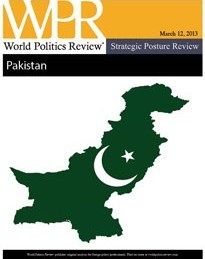
Given domestic economic weaknesses, security competition with India and an antagonistic relationship with Afghanistan, Pakistan has traditionally sought external alliances with strong powers and pursued an offensive security policy. Nevertheless, there has been a dawning realization in Islamabad that a new approach is necessary, and as a result, Pakistan’s foreign and defense policies are undergoing important transformations, including a normalization of relations with neighbors and a renewed focus on domestic security threats. With a low growth rate, high inflation, budget deficits and unsustainable debt, economic weakness is the single biggest challenge for Pakistan. A major energy shortage, which both results […]






